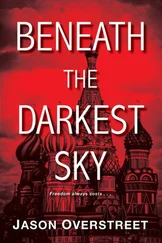“You must save me,” she said between kisses.
“Yes,” he answered solemnly.
He was as comforting as Belqassim had been disturbing.
Atallah did not lift the curtain until evening, when by the light of his lamp he saw them both asleep on the blanket. He set the lamp down in the doorway and went out.
Some time later she awoke. It was silent and hot in the room. She sat up and looked at the long black body beside her, inert and shining as a statue. She laid her hands on the chest: the heart beat heavily, slowly. The limbs stirred. The eyes opened, the mouth broke into a smile.
“I have a big heart,” he said to her, putting his hand over hers and holding it there on his chest.
“Yes,” she said absently.
“When I feel well, I think I’m the best man in the world. When I’m sick, I hate myself. I say: you’re no good at all, Amar. You’re made of mud.” He laughed.
There was a sudden sound in another part of the house. He felt her cringe. “Why are you afraid?” he said. “I know. Because you are rich. Because you have a bag full of money. Rich people are always afraid.”
“I’m not rich,” she said. She paused. “It’s my head. It aches.” She pulled her hand free and moved it from his chest to her forehead.
He looked at her and laughed again. “You should not think. Ça c’est mauvais. The head is like the sky. Always turning around and around inside. But very slowly. When you think, you make it go too fast. Then it aches.”
“I love you,” she said, running her finger along his lips. But she knew she could not really get to him.
“Moi aussi,” he replied, biting her finger lightly.
She wept, and let a few tears fall on him; he watched her with curiosity, shaking his head from time to time.
“No, no,” he said. “Cry a little while, but not too long. A little while is good. Too long is bad. You should never think of what is finished.” The words comforted her, although she could not remember what was finished. “Women always think of what is finished instead of what is beginning. Here we say that life is a cliff, and you must never turn around and look back when you’re climbing. It makes you sick.” The gentle voice went on; finally she lay down again. Still she was convinced that this was the end, that it would not be long before they found her. They would stand her up before a great mirror, saying to her: “Look!” And she would be obliged to look, and then it would be all over. The dark dream would be shattered; the light of terror would be constant; a merciless beam would be turned upon her; the pain would be unendurable and endless. She lay close against him, shuddering. Shifting his body toward her, he took her tightly in his arms. When next she opened her eyes the room was in darkness.
“You can never refuse a person money to buy light,” said Amar. He struck a match and held it up.
“And you are rich,” said Atallah, counting her thousand-franc notes one by one.
“Vôtre nom, madame. Surely you remember your name.”
She paid no attention; it was the only way of getting rid of them.
“C’est inutile. You won’t get anything out of her.”
“Are you certain there’s no kind of identification among her clothing?”
“None, mon capitaine.”
“Go back to Atallah’s and look some more. We know she had money and a valise.”
A cracked little church bell pealed from time to time. The nun’s garments made a rippling sound as she moved about the room.
“Katherine Moresby,” said the sister, pronouncing the name slowly and all wrong. “C’est bien vous, n’est-ce pas?”
“They took everything but the passport, and we were lucky to find that.”
“Open your eyes, madame.”
“Drink it. It’s cool. It’s lemonade. It won’t hurt you.” A hand smoothed her forehead.
“No!” she cried. “No!”
“Try to lie still.”
“The Consul at Dakar advises sending her back to Oran. I’m waiting for a reply from Algiers.”
“It’s morning.”
“No, no, no!” she moaned, biting the pillowcase. She would never let any of it happen.
“It’s taking this long to feed her only because she refuses to open her eyes.”
She knew that the constant references to her closed eyes were being made only in order to trap her into protesting: “But my eyes are open.” Then they would say: “Ah, your eyes are open, are they? Then—look!” and there she would be, defenseless before the awful image of herself, and the pain would begin. This way, sometimes for a brief moment she saw Amar’s luminous black body near her in the light of the lamp by the door, and sometimes she saw only the soft darkness of the room, but it was an unmoving Amar and a static room; time could not arrive there from the outside to change his posture or split the enveloping silence into fragments.
“It’s arranged. The Consul has agreed to pay the Transafricaine for her passage. Demouveau goes out tomorrow morning with Estienne and Fouchet.”
“But she needs a guard.”
There was a significant silence.
“She’ll sit still, I assure YOU.”
“Fortunately I understand French,” she heard herself saying, in that language. “Thank you for being so explicit.” The sound of such a sentence coming from her own lips struck her as unbelievably ridiculous, and she began to laugh. She saw no reason to stop laughing: it felt good, there was an irresistible twitching and tickling in the center of her that made her body double up, and the laughs rolled out. It took them a long time to quiet her, because the idea of their trying to stop her from doing something so natural and delightful seemed even funnier than what she had said.
When it was all over, and she was feeling comfortable and sleepy, the sister said: “Tomorrow you are going on a trip. I hope you will not make things more difficult for me by obliging me to dress you. I know you are capable of dressing yourself.”
She did not reply because she did not believe in the trip. She intended to stay in the room lying next to Amar.
The sister made her sit up, and slipped a stiff dress over her head; it smelled of laundry soap. Every so often she would say: “Look at these shoes. Do you think they will fit you?” Or: “Do you like the color of your new dress?” Kit made no answer. A man had hold of her shoulder and was shaking her.
“Will you do me the favor of opening your eyes, madame?” he said sternly.
“Vous lui faites mal,” said the sister.
She was moving with others in a slow procession down an echoing corridor. The feeble church bell clanged and a cock crowed nearby. She felt the cool breeze on her cheek. Then she smelled gasoline. The men’s voices sounded small in the immense morning air. Her heart began to race when she got into the car. Someone held her arm tightly, never letting go for an instant. The wind blew through the open windows, filling the car with the pungent odor of wood-smoke. As they jolted along, the men kept up a constant conversation, but she did not listen to it. When the car stopped there was a very brief silence in which she heard a dog barking. Then she was taken out, car doors were slammed, and she was led along stony ground. Her feet hurt: the shoes were too small. Occasionally she said in a low voice, as if to herself. “No.” But the strong hand never let go of her arm. The smell of gasoline was very heavy here. “Sit down.” She sat, and the hand continued to hold her.
Each minute she was coming nearer to the pain; there would be many minutes before she would actually have reached it, but that was no consolation. The approach could be long or short—the end would be the same. For an instant she struggled to break free.
Читать дальше











